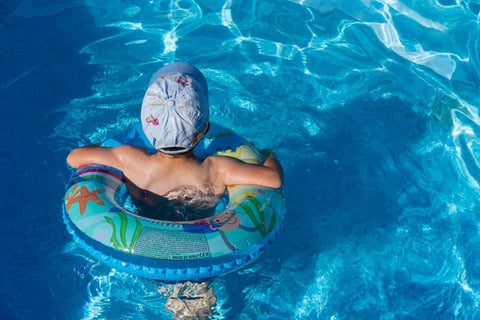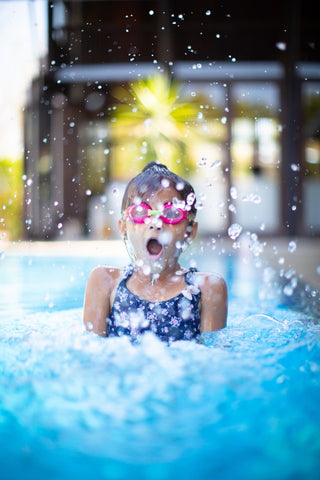Your Cart is Empty
FREE Shipping WORLDWIDE | $5 OFF Use Code SURF5BUCKS

How many swimming lessons does a child need? You may be wondering what the best number of lessons is for a toddler. This article will explain why swimming lessons are essential for toddlers. Learn how swimming affects your child's development, how many lessons are enough, and what tricks to use to keep your child interested and excited about the water. And, of course, learn how many swimming lessons a child really needs.
If you're worried about your child's drowning risk, you're not alone. Children come in contact with water all the time, and drowning is the second most preventable cause of unintentional death in children under 10. According to Dr. Ruth Brenner of the Eunice Kennedy Shriver National Institute of Child Health and Human Development, taking swimming lessons can reduce your child's risk of drowning by eighty percent.
Although the AAP recommends that children begin swimming lessons as early as one year old, there are several factors to consider. First, children develop at different rates, and they may not be ready to learn to swim until they are three or four. Consider your child's physical abilities, emotional maturity, and comfort level around water when deciding when to begin lessons. The American Academy of Pediatrics (AAP) recommends that children learn to swim from age one.
Next, make sure the instructors are certified. Having a certified instructor ensures consistency and a step-by-step curriculum. Second, make sure the ratio of children to instructors is low, especially for young children. It should be within arm's reach so that the instructor can monitor all students. As children learn to swim, their group sizes can increase, but they should not exceed a teacher's capacity. If your child dislikes swimming, he or she should not be forced to do so. It may even encourage him or her to develop other social skills.
As a team sport, swimming requires both individual and teamwork skills. This camaraderie is essential for Olympic-level swimming. Children learn teamwork and individual responsibility, qualities that are invaluable in many other activities, such as math or writing. And, unlike many team sports, swimming is a social activity. As a result, kids who don't know how to swim are more likely to feel socially isolated, which can be detrimental to their confidence.
The benefits of swimming go beyond improving physical health. The activity has been proven to help children develop a strong mind-body connection. Even infants who spend hours swimming have better concentration, greater self-esteem, and greater motivation in their schoolwork.
Further, early exposure to water promotes awareness and confidence around water and a reduction in fear and panic attacks. Further, it also helps children develop their sense of self-esteem, which is important in their future endeavors. A swimming lesson improves a child's confidence and self-esteem. A child who learns to swim enjoys the sense of achievement that comes with achieving new goals. Additionally, children who participate in swimming lessons develop better motor and physical skills, which translate directly to learning in the classroom. These benefits are not only a result of swimming but of all of the positive aspects of the sport. If you are thinking about enrolling your child in a swim lesson, you will definitely be making a good choice.
If you are not a fan of the water, you can make sure your child likes swimming by following these simple tricks. You can use goggles and other water toys to get your child interested in swimming. Besides, you can play games in the water such as playing in the bathtub or blowing bubbles. These tricks will help your child get comfortable with water and have fun in it. Here are some of the tricks you can try:
To teach your child the basic movement of swimming, you can sit beside your child on a shallow step of the pool. You can also hold the edge of the pool to guide them. Show them that a green light means to kick fast. A red light means to stop kicking. You can also tell them to point their toes so that they will propel through the water. For older children, you can help them balance on a flutter board.
Another way to teach your child to swim without drowning is to hold your child in a shallow end and support their waist with your hands. Then, ask your child to jump off of their knees and use the propulsion from the jump to reach the wall. After a while, let your child hold on to the wall to support their body weight. You will see the benefits of this simple trick in no time.

How many swimming lessons does a child really require? It all depends on your child's age and ability. Most 3-5-year-olds need between 20 and thirty lessons to master the basics. Depending on the age and skill level, it could take longer.
But the key is to not rush your child into a class that lasts more than an hour. The goal of swimming lessons is to make a child as comfortable and safe as possible in the water. If a child is already comfortable in the water and has little fear, fewer lessons are needed.
Parents often ask how many swimming lessons a child really needs. Some ask for a set number of lessons, while others ask for a range. The answer depends on the child's ability and desired end goal. Some children will learn faster than others, while others may have an easier time getting in the water. Regardless of the number of swimming lessons a child needs, it's important that the parent support the child's learning process as much as possible.
Children are spending more time than ever watching screens, and this can lead to health concerns and behavioral problems. Experts recommend limiting screen time in children under five. Swimming can be a great opportunity to introduce your child to other non-screen activities. While swimming might not be the ideal activity for your child, it will help them build confidence and spark an interest in water activities. If your child enjoys the activity, he will surely take it up.

When choosing a swimming lesson for your child, the first thing to consider is whether or not it is appropriate for your child's age and developmental stage. Babies and toddlers tend to have busy schedules, so it can be difficult to commit to structured activities. The first step in choosing a swimming lesson for your child is to research the different classes in your area. Look for classes where your child can demonstrate specific swimming skills. Check the certifications of the instructors and pay close attention to the management style.
When to schedule the lesson: Babies who nap before class are usually not at their best. Similarly, toddlers who nap later are less likely to have an energetic swim lesson. If possible, try to schedule the swim lesson an hour or two before or after naptime. You should also consider the time of the day. Infants should take naps early in the afternoon or before the lesson. However, if this is not an option, try to schedule the swim lesson as early as possible.
Before you start with swimming lessons, get a nice swimwear for your kid and make sure to pack everything child needs for swimming. When choosing a swimming lesson for your child, you should keep in mind that children develop at different rates, so the age of the class should be based on the child's physical development, emotional maturity, and comfort level in the water. The American Academy of Pediatrics recommends swimming lessons for kids over four months, which is still early for them to develop their swimming skills independently. And if your child seems disinterested in learning to swim, you may want to consider a different option for swimming lessons.
However, recent research has revealed that previous negative experiences with water can negatively impact a child's enrolment, learning, and maintenance of swimming lessons. Some parents may project their own fears and experiences into their child, even if the child appears resilient. To understand the nature of such experiences, further research is needed. In particular, longitudinal studies and qualitative research are needed to understand the causes and consequences of bad experiences in the water.
Learning to swim is one of the most valuable life skills a child can learn. It will open up a world of fun activities, such as boating and fishing. It will also help them cope with a fear of deep water, preventing them from developing a more intense phobia of water. As a result, the benefits of swimming lessons can be felt long after the lessons are completed. Most of the time, parents don't care about the price of swimming lessons, as they are so important for their child.

Learning to swim is not an easy task. In fact, it is so difficult that some children will simply cry. This is an indication that they have a low level of trust in water. Children who are afraid of the water will never attempt this skill without supervision.The results of this study can also be applied to classroom learning. When children become self-confident, they will learn to swim and will become independent.
It takes children an average of six to eight weeks to learn basic swimming skills. However, number of lessons depending on the child's age, previous experience, and level of comfort in the water. Some children may take longer to learn, while others may pick it up more quickly.
Swimming is a skill that can be learned at any age, but it is generally easiest to learn at a young age. For a seven year old, it is reasonable to expect that they will be able to learn to swim within a few weeks to a couple of months.
The amount of time it takes to learn to swim can vary depending on the child's level of comfort in the water and their natural ability to swim.
Most five-year-olds are able to swim without floatation devices by the end of summer if they have had swim lessons and practice. It is recommended that children start taking swim lessons by age four to help them become more comfortable and confident in the water.
ABOUT THE AUTHOR
Olivia Poglianich
Content Strategist
Olivia Poglianich is a nomadic brand strategist and copywriter in the surf, watersports and outdoor adventure space who has worked with brands such as Visa, Disney and Grey Goose. Her writing has taken her all over the world, from a Serbian music festival to a Malaysian art and culture event. Olivia is a graduate of Cornell University and is often writing or reading about travel, hospitality, the start-up ecosystem or career coaching. Her latest interests are at the intersection of web3 and communal living, both on and offline.
